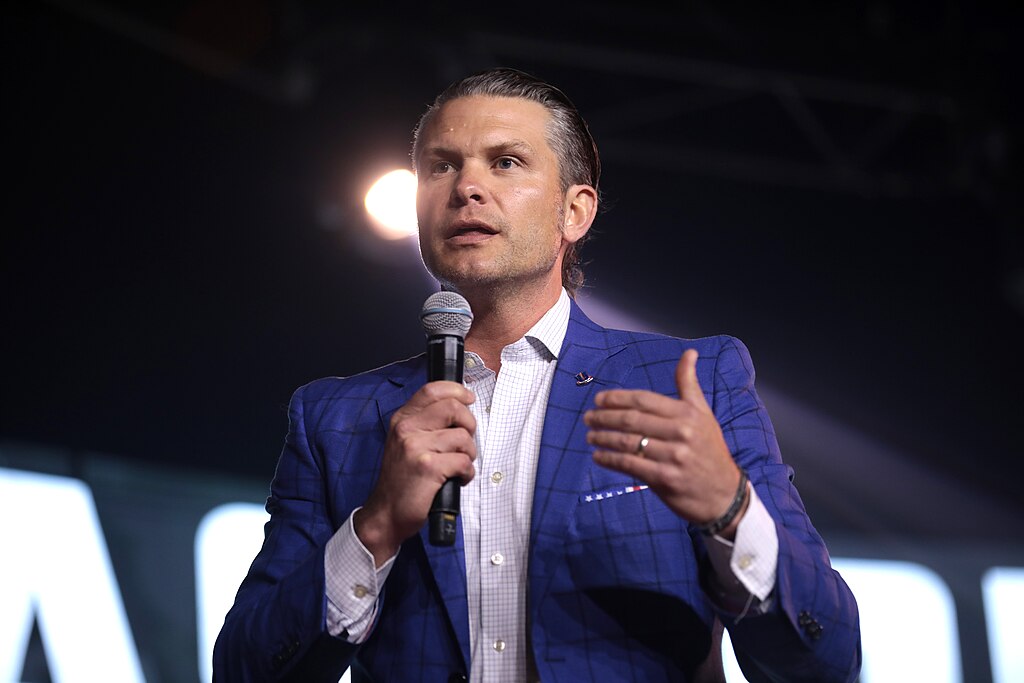Pete Hegseth, a decorated 20-year veteran with an unwavering commitment to military advocacy, has been confirmed as the next Secretary of Defense. His appointment marks a dramatic shift in Pentagon leadership, signaling a bold new direction under the incoming administration.
Hegseth, a former Army officer with two Bronze Stars and a Combat Infantryman Badge, brings firsthand combat experience to the Department of Defense. Having served tours in Iraq, Afghanistan, and as a guard at Guantanamo Bay, he’s widely regarded as a leader who understands the complexities of modern warfare from both a strategic and operational perspective.
Beyond his battlefield accomplishments, Hegseth’s credentials include two Ivy League degrees, underscoring his intellectual rigor and policy expertise. A graduate of Princeton University and Harvard University’s John F. Kennedy School of Government, Hegseth has blended his academic pedigree with a career dedicated to advocating for veterans’ issues. As a prominent voice for veterans, he’s championed reforms to improve healthcare, education, and job opportunities for former service members.
While Hegseth’s supporters praise his leadership and commitment to military reform, his appointment has not come without controversy. Critics have expressed concerns over his lack of prior experience in Pentagon bureaucracy and his staunchly conservative views on defense policies. Hegseth has long been an outspoken advocate for streamlining military operations and eliminating bureaucratic inefficiencies, positions that may lead to friction within the established ranks of the defense apparatus.
Hegseth’s approach to leadership is expected to focus heavily on restoring what he describes as “core military values.” This includes a heightened emphasis on combat readiness, a reevaluation of military spending priorities, and a reassessment of diversity and inclusion initiatives that he believes may detract from the armed forces’ operational effectiveness. These positions have already sparked debate among policymakers, with some applauding his direct approach while others caution against potential alienation within the ranks.
Veterans’ advocacy groups, however, have largely welcomed Hegseth’s appointment. “Pete has walked the walk,” said one veterans’ organization leader. “He knows what it means to serve and sacrifice, and he’s been in the trenches fighting for those who have worn the uniform.”
Hegseth himself has promised a “mission-first” mentality at the Pentagon, aiming to prioritize national defense strategies over what he has criticized as “bureaucratic stagnation.” Insiders predict his tenure will bring sweeping changes to defense policy, particularly in areas such as military readiness, veteran care, and defense spending.
The confirmation of Hegseth as Secretary of Defense has set the stage for a transformative era in Pentagon leadership. As the U.S. faces complex global challenges, his unique blend of combat experience, academic insight, and unapologetic advocacy for reform is poised to redefine the trajectory of the nation’s defense strategy.



 Macron Urges Emergency UN Security Council Meeting as US-Israel Strikes on Iran Escalate Middle East Tensions
Macron Urges Emergency UN Security Council Meeting as US-Israel Strikes on Iran Escalate Middle East Tensions  Trump Announces U.S. Strikes on Iran Navy as Conflict Escalates
Trump Announces U.S. Strikes on Iran Navy as Conflict Escalates  Israel Declares State of Emergency as Iran Launches Missile Attacks
Israel Declares State of Emergency as Iran Launches Missile Attacks  Why did Iran bomb Dubai? A Middle East expert explains the regional alliances at play
Why did Iran bomb Dubai? A Middle East expert explains the regional alliances at play  Suspected Drone Strike Hits RAF Akrotiri Base in Cyprus, Causing Limited Damage
Suspected Drone Strike Hits RAF Akrotiri Base in Cyprus, Causing Limited Damage  Trump Warns Iran as Gulf Conflict Disrupts Oil Markets and Global Trade
Trump Warns Iran as Gulf Conflict Disrupts Oil Markets and Global Trade  UK Accepts U.S. Request to Use British Bases for Defensive Strikes on Iranian Missiles
UK Accepts U.S. Request to Use British Bases for Defensive Strikes on Iranian Missiles  U.S. Lawmakers Question Trump’s Iran Strategy After Joint U.S.-Israeli Strikes
U.S. Lawmakers Question Trump’s Iran Strategy After Joint U.S.-Israeli Strikes  EU Urges Maximum Restraint in Iran Conflict Amid Fears of Regional Escalation and Oil Supply Disruption
EU Urges Maximum Restraint in Iran Conflict Amid Fears of Regional Escalation and Oil Supply Disruption  Does international law still matter? The strike on the girls’ school in Iran shows why we need it
Does international law still matter? The strike on the girls’ school in Iran shows why we need it  Trump Says U.S. Combat Operations in Iran Will Continue Until Objectives Are Met
Trump Says U.S. Combat Operations in Iran Will Continue Until Objectives Are Met  U.S.-Israel Strike on Iran Escalates Middle East Conflict, Trump Claims Khamenei Killed
U.S.-Israel Strike on Iran Escalates Middle East Conflict, Trump Claims Khamenei Killed  Israel Launches Fresh Strikes on Iran After Death of Supreme Leader Ayatollah Khamenei
Israel Launches Fresh Strikes on Iran After Death of Supreme Leader Ayatollah Khamenei  Australia Rules Out Military Involvement in Iran Conflict as Middle East Tensions Escalate
Australia Rules Out Military Involvement in Iran Conflict as Middle East Tensions Escalate  U.S. Deploys Tomahawks, B-2 Bombers, F-35 Jets and AI Tools in Operation Epic Fury Against Iran
U.S. Deploys Tomahawks, B-2 Bombers, F-35 Jets and AI Tools in Operation Epic Fury Against Iran  Middle East Conflict Escalates After Khamenei’s Death as U.S., Israel and Iran Exchange Strikes
Middle East Conflict Escalates After Khamenei’s Death as U.S., Israel and Iran Exchange Strikes  HHS Adds New Members to Vaccine Advisory Panel Amid Legal and Market Uncertainty
HHS Adds New Members to Vaccine Advisory Panel Amid Legal and Market Uncertainty 































